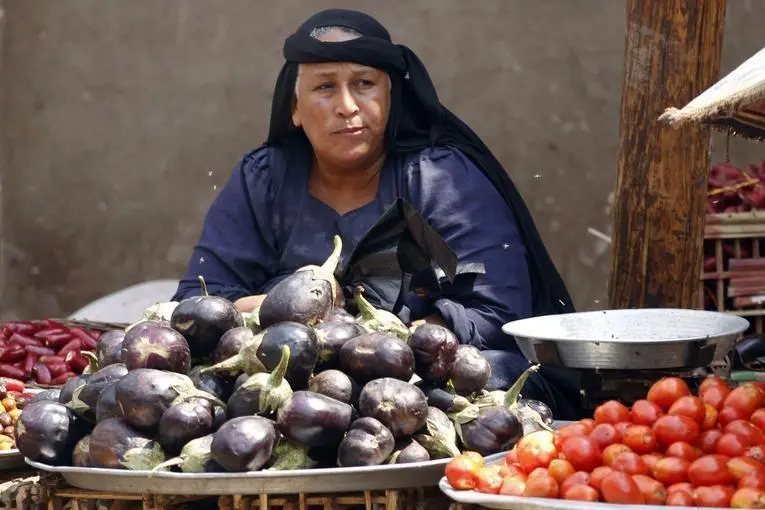PHOTO
The cost of vegetables and other essential food items have suddenly spiked in price, reports Mona El-Fiqi
Vegetable prices were the talk of the town this week, with okra selling at LE25 per kg and beans at LE12 per kg, both double their regular price. Tomatoes were selling at around three times their regular price at LE10 per kg.
The price tag on these vegetables has made them unaffordable for many families. "These vegetables will now have to be added to some families' list of forbidden items, which already includes meat and poultry. These kinds of food are rarely cooked in our house," said Ashraf Hussein, a construction worker.
Contrary to expectations, however, recent figures show that Egypt's annual urban inflation and core inflation both slowed in April. According to the Central Agency for Public Mobilisation and Statistics (CAPMAS), the urban consumer inflation rate fell from 11.5 per cent in March to 11 per cent in April.
According to the Central Bank of Egypt, the country's core annual inflation rate, which excludes items like fruit and vegetables, eased slightly from 7.21 per cent in March to 7.19 per cent in April.
Global food prices also fell in April to their lowest level since June 2010, with prices sliding for most commodities, according to the UN Food and Agriculture Organisation's (FAO) price index.
Ahmed Al-Wakeel, head of the Egyptian Federation for Chambers of Commerce, told the Weekly that the increase in the price of some vegetables was seasonal and occurred every year.
Ashraf Kamal, a professor of economics at the Agricultural Research Institute, added that at the beginning of the summer season and harvest time, the supply of some agricultural products is less than usual and the quality is also lower, so it is normal to see hikes in prices.
He said that once the harvest has been collected prices will drop to their normal level. It is impossible simply to increase supply to cope with a shortage, he said, since it is necessary to wait for the harvest.
But he blamed the government for not doing its homework in controlling the markets. "It always waits until a problem occurs before intervening, and then the result is not as it should be. Supplying cooperative stores with 500 tons of vegetables will do nothing for prices and will not cover people's needs," Kamal said.
Following protests against the price hikes and calls for the government to intervene, Minister of Supply and Internal Trade Khaled Hanafi announced that 500 tons of vegetables will be available at the governmental cooperatives at prices 20 to 25 per cent lower than market prices in order to balance supply. According to press reports, the move has already cooled down prices.
But Kamal believes the government should make more effort to increase the supply of products at cooperatives throughout the year and across the country, in urban areas as well as in small villages.
If need be, the government should itself produce certain products in order to keep their prices affordable for consumers, he said. "Maintaining the price of vegetables and basic food items at a reasonable level should top the government's priorities as it is essential to achieve social justice," Kamal said.
The increased prices are not just seasonal, according to Ali Abdel-Rahman, a former advisor to the minister of supply and internal trade. He said that the higher prices seen over the past few years can be attributed to an increase in production costs.
The cost of cultivating tomatoes used to be LE7,000 per feddan, but today it is LE14,000, he said. Abdel-Rahman said that fertiliser prices have risen from LE60 to LE200 per bag (50KG), in addition to rises in wages and transportation expenses, particularly after the gradual removal of fuel subsidies in 2014.
Abdel-Rahman blamed the government for not doing enough to support the country's farmers, as is done in the developed world. By leaving prices to float according to supply and demand, the government has made consumers the victims of "greedy traders."
He also blamed the government for minimising the role of consumer protection organisations. "They should be encouraged and supported by the government so they can play their role in monitoring and controlling prices," he added.
Abdel-Rahman said that when prices rise without justification consumers should refrain from buying such goods in order to force vendors and traders to reduce prices, particularly since agricultural goods are easily perishable and cannot be stored for long.
Defending the country's traders, Al-Wakeel said that the prices of 95 per cent of basic food commodities were stable in May 2015, compared to May 2014, in around 500,000 outlets and supermarkets across the country, according to the federation's figures.
He explained that only five per cent of products had risen in price by around five per cent, despite the around nine per cent depreciation of the Egyptian pound compared to last year.
Low incomes have added to the problem, according to Al-Wakeel. The minimum monthly wage of LE1,200 ($160), he said, is "not enough for a decent standard of living."
Many people working in the informal or private sector, in fact, do not receive even the minimum wage, which applies mostly to those working for the government.
© Al Ahram Weekly 2015





















